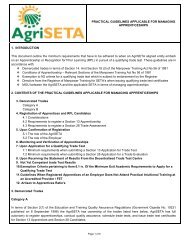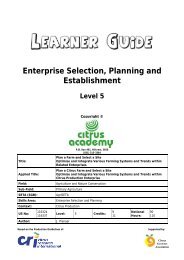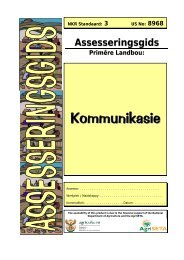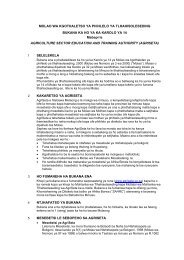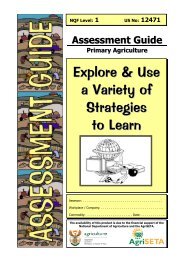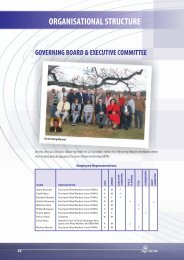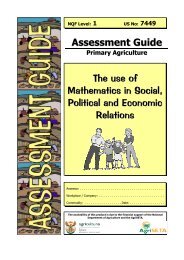Effective communication skills - AgriSETA
Effective communication skills - AgriSETA
Effective communication skills - AgriSETA
Create successful ePaper yourself
Turn your PDF publications into a flip-book with our unique Google optimized e-Paper software.
Maintain and adapt oral <strong>communication</strong><br />
12<br />
Primary Agriculture NQF Level 2 Unit Standard No: 8962<br />
Note: It is required that provision is made for<br />
assimilation of information and the reproduction<br />
thereof in learners own words. The effective<br />
answering of this question entails the correct<br />
identification of the type of barrier and a short<br />
accurate explanation of the identified barriers in the<br />
category.<br />
Cross-cultural <strong>communication</strong> takes place when the<br />
sender and receiver are of different cultures. (Culture<br />
describes the norms, values, beliefs and perceptions<br />
shared by a group of people.)<br />
4. Explain the cross-cultural<br />
barriers to <strong>communication</strong>.<br />
The differences in terms of the above often lead to:<br />
• Stereotyping. - we generalise about a<br />
group, often resulting in racist or sexist<br />
language<br />
• Ethnocentricity. - judging everyone else<br />
according to one’s own norms, beliefs and<br />
values.<br />
• Language - a complex problem in crosscultural<br />
<strong>communication</strong>. Most of us have an<br />
inner picture of what a word or phrase<br />
means, and when that inner picture differs,<br />
there can be a breakdown in <strong>communication</strong>.<br />
• Jargon or slang - specialist words that<br />
relate to a particular profession, which are<br />
not readily understood by a layman - will<br />
impede <strong>communication</strong>.<br />
• Symbols – symbol can mean different<br />
things to different people.<br />
• Different concepts of space and time –<br />
may lead to discomfort and thus impacts on<br />
the message.<br />
• Eye contact, touch and gestures - mean<br />
different things to different cultures. The<br />
important thing is to recognise the<br />
differences and to avoid the assumption that<br />
your way is the only way-to avoid being<br />
ethnocentric.<br />
Version: 01 Version Date: July 2006




